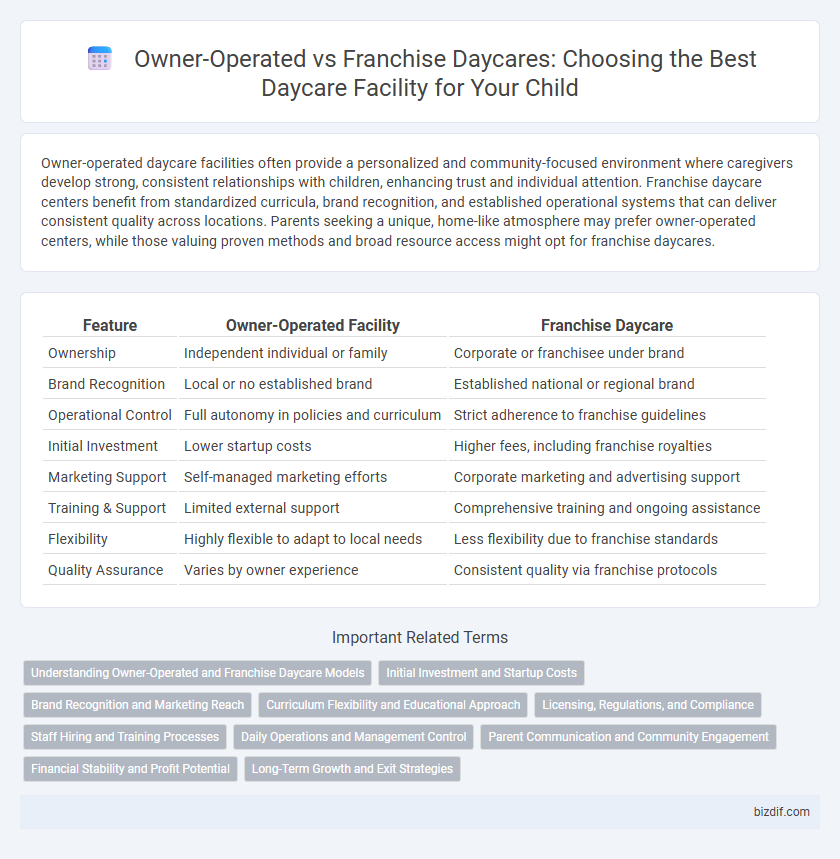Owner-operated daycare facilities often provide a personalized and community-focused environment where caregivers develop strong, consistent relationships with children, enhancing trust and individual attention. Franchise daycare centers benefit from standardized curricula, brand recognition, and established operational systems that can deliver consistent quality across locations. Parents seeking a unique, home-like atmosphere may prefer owner-operated centers, while those valuing proven methods and broad resource access might opt for franchise daycares.
Table of Comparison
| Feature | Owner-Operated Facility | Franchise Daycare |
|---|---|---|
| Ownership | Independent individual or family | Corporate or franchisee under brand |
| Brand Recognition | Local or no established brand | Established national or regional brand |
| Operational Control | Full autonomy in policies and curriculum | Strict adherence to franchise guidelines |
| Initial Investment | Lower startup costs | Higher fees, including franchise royalties |
| Marketing Support | Self-managed marketing efforts | Corporate marketing and advertising support |
| Training & Support | Limited external support | Comprehensive training and ongoing assistance |
| Flexibility | Highly flexible to adapt to local needs | Less flexibility due to franchise standards |
| Quality Assurance | Varies by owner experience | Consistent quality via franchise protocols |
Understanding Owner-Operated and Franchise Daycare Models
Owner-operated daycare facilities are independently managed by individuals who oversee daily operations and maintain direct control over curriculum and staff, ensuring personalized care and community-focused services. Franchise daycare centers operate under a larger corporate brand, providing standardized programs, established marketing strategies, and access to extensive resources but with less flexibility in adapting to local needs. Understanding these models helps parents and caregivers choose between personalized attention in owner-operated settings and the consistency and scalability offered by franchise daycares.
Initial Investment and Startup Costs
Owner-operated facilities typically require lower initial investment and startup costs, as they avoid franchise fees and royalties, focusing expenses on licensing, equipment, and space. Franchise daycares demand higher upfront costs due to franchise fees, mandatory branding, and ongoing support payments, but benefit from established curricula and marketing. Evaluating these financial commitments is crucial for prospective daycare entrepreneurs planning their budget and long-term profitability.
Brand Recognition and Marketing Reach
Owner-operated daycare facilities often rely on local reputation and personalized marketing efforts, resulting in limited brand recognition and a narrower marketing reach. Franchise daycares benefit from established brand recognition and extensive corporate marketing strategies that enhance visibility and attract a broader client base. Strong franchising networks enable consistent promotional campaigns, providing competitive advantages over independent operations in customer acquisition.
Curriculum Flexibility and Educational Approach
Owner-operated daycare facilities often provide greater curriculum flexibility, allowing educators to tailor programs specifically to the developmental needs of their community and individual children. Franchise daycare centers follow established curricula and standardized educational approaches designed by the parent company, ensuring consistency but limiting adaptability to local preferences. Customized lesson plans and innovative teaching methods are more readily implemented in owner-operated settings, promoting personalized learning experiences.
Licensing, Regulations, and Compliance
Owner-operated daycare facilities often maintain stricter control over licensing processes and regulatory compliance due to their direct involvement in daily operations, ensuring personalized adherence to local childcare laws. Franchise daycares benefit from standardized protocols and corporate support to meet licensing requirements, but may face challenges aligning regional regulations with uniform company policies. Both models must comply with state-specific childcare regulations, staff qualifications, and safety standards, though owner-operated centers typically adapt more flexibly to changes in compliance mandates.
Staff Hiring and Training Processes
Owner-operated daycare facilities typically implement personalized staff hiring processes that emphasize local community connections and prioritize cultural fit, resulting in closely monitored training programs tailored to specific child development philosophies. Franchise daycares adopt standardized hiring protocols backed by comprehensive corporate training modules designed to ensure consistency and regulatory compliance across multiple locations. The structured approach in franchises often leads to uniform staff qualifications, whereas owner-operated centers may offer more flexible and adaptive staff development strategies.
Daily Operations and Management Control
Owner-operated daycare facilities provide direct, hands-on management with personalized oversight of daily operations, allowing for flexible scheduling and immediate responsiveness to children's needs. Franchise daycares follow standardized operational protocols and brand guidelines, offering consistency but often limiting individual managerial autonomy. This centralized control in franchise models enhances scalability but can reduce the ability to tailor services to specific community or family preferences.
Parent Communication and Community Engagement
Owner-operated daycare facilities often provide personalized parent communication through direct interactions with the owner, fostering trust and tailored updates. Franchise daycares utilize standardized communication systems and digital platforms for consistent information delivery but may lack individualized attention. Community engagement in owner-operated centers is typically local and intimate, while franchises leverage broader networks for organized events and brand-driven initiatives.
Financial Stability and Profit Potential
Owner-operated daycare facilities often benefit from lower startup costs and greater control over financial decisions, which can enhance profit potential through customized pricing and expense management. Franchise daycares typically offer established brand recognition, marketing support, and standardized operating procedures that contribute to more predictable revenue streams and financial stability. However, franchise fees and royalties may reduce overall profitability compared to independently owned centers focused on localized community engagement.
Long-Term Growth and Exit Strategies
Owner-operated daycare facilities offer greater flexibility in decision-making and provide a personalized approach to long-term growth, allowing owners to adapt services based on community needs and market trends. Franchise daycares benefit from established brand recognition and standardized operational systems, which can enhance scalability and appeal to investors during exit strategies. Exit planning in owner-operated centers often involves selling to individual buyers or passing ownership to family, while franchise owners may have options to sell back to the franchisor or transfer the franchise to qualified parties under contract terms.
Owner-operated Facility vs Franchise Daycare Infographic

 bizdif.com
bizdif.com